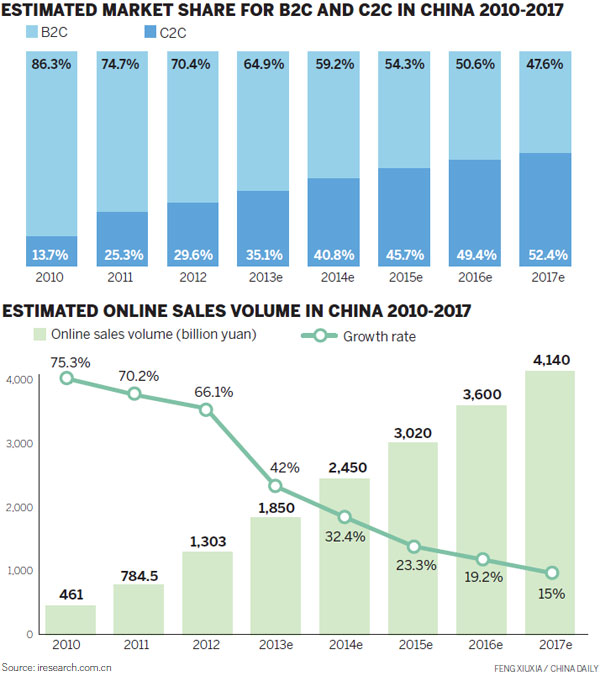Net profit
Updated: 2014-05-23 07:41
By Meng Jing (China Daily Europe)
|
|||||||||||
Statistics from the China E-commerce Research Center showed that the online daigou market amounted to 74.4 billion yuan in 2013. The center forecast that the market would exceed 100 billion yuan in 2014.
The booming daigou business is also part of the reason why Alibaba chose to launch an independent website called Tmall Global in February to allow overseas brands and merchants to sell directly to Chinese online shoppers.
Alibaba said more than 140 companies, which sell thousands of international brands from the United States to Japan, have opened for business on Tmall Global.
Rather than simply using e-commerce as a sales channel, more and more multinational brands are seeing it as an effective method of marketing and for eliciting feedback from Chinese customers, says Huang Zhixiong, vice-president of yhd.com, a Shanghai-based e-commerce company that is majority-owned by US-based retail giant Wal-Mart Stores Inc.
"It usually costs a fortune for foreign brands to sell across China because it is pricey to build up sales channels. They need to find a national sales representative and all kinds of local sales representatives across the country, which will eventually split profits. And they also need to rent warehouses across the country to ensure the supplies and delivery," says Huang.
But now, most of these brands, which want to expand into China, can simply sell online and e-commerce platforms can provide the real-time sales data to give them feedback on new products.
As one of the most popular online supermarkets in China, yhd.com has teamed up with 200 brands directly. Through the partnership, yhd.com can get lower-priced products directly from producers rather than sales representatives, while brands can get feedback on whether or not customers like their newly launched products.
"About half of the 200 brands, which are directly cooperating with us, are multinational brands. It is obvious they are paying more and more attention to e-commerce. Years ago, most of them simply saw us as a sales channel, but now they understand that we can offer more than services with our data digging technology," he says.
According to Huang, many of yhd.com's partner brands have already set up specialized teams to handle aspects like sales, marketing and research and development.
Though e-commerce has offered multinational brands a great platform to engage with Chinese consumers, it doesn't mean that they can simply set up virtual storefronts and expect the money to keep coming in.
T J Wu, sales director of Hybris Greater China, a leading enterprise in Asia, which helps businesses around the globe sell more goods, services and digital content through an omni-channel strategy, says that Chinese people are extremely brand conscious and brands need to have a particular level of awareness or reputation to attract customers.
"And as they grow more discerning, multinationals are having to work harder to prove their worth - and are having to defend their brands on China's wild social media," he says.
According to Wu, most of the major US and European retailers have opened traditional brick-and-mortar stores in China, but many maintain only informational Chinese language websites with no transactional capabilities.
"However, to garner reputation and presence in China to run the business successfully, brands will have to eventually adapt both online and offline strategies and omni-channel solutions will prove to be the clincher," he says.
"What we are seeing is a growing tension between authorized sites on Tmall and the company's original sites," Wu says.
It all depends on the existing presence and position of the foreign brands and if they can attract traffic onto their websites and the ability of the merchants to sell certain items only through original channels. In the long run, there will be less dependence on Tmall or other marketplace platforms, he says.
At the same time, Wu says, the approach makes sense for lesser-known brands as it helps them set up authorized sites amongst the largest e-commerce platforms in China and gain potential customers.
"All this ties back to consumer behavior and preferences. With more foreign vendors looking to reach out to local consumers, it is bound to trigger more competition with local e-commerce companies," Wu says.
mengjing@chinadaily.com.cn

(China Daily European Weekly 05/23/2014 page1)
Today's Top News
Egypt angered about China's fake Sphinx
Poroshenko wins Ukraine election - exit poll
Euro elections reflect EU consensus
Pope calls for Israel-Palestine peace
Click profit online in China
Ukraine's presidential polls backfire
EU-wide elections could shake up the bloc
Beijing urges to intensify terror fight
Hot Topics
Lunar probe , China growth forecasts, Emission rules get tougher, China seen through 'colored lens', International board,
Editor's Picks

|

|

|

|

|

|





